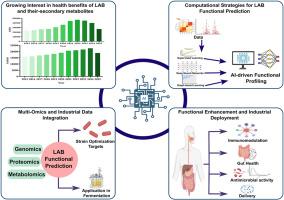Artificial intelligence-driven strategies to enhance the application of lactic acid bacteria as functional probiotics: Health promotion and optimization for industrial applications
IF 15.4
1区 农林科学
Q1 FOOD SCIENCE & TECHNOLOGY
引用次数: 0
Abstract
Background
Lactic acid bacteria (LAB) are widely recognized for their probiotic properties and health-promoting effects, including modulation of gut microbiota, immune regulation, and metabolic support. However, traditional approaches to identifying and applying functional LAB strains are labor-intensive and limited in their scalability. With the growing demand for precision probiotics and microbiome-targeted therapies, there is an urgent need for advanced methods that can systematically optimize the functionalities of LAB.
Scope and approach
This review explores how artificial intelligence (AI) technologies, including machine learning, deep learning, and hybrid models, can enhance LAB-based probiotic research and applications. We categorize current AI applications across three major domains: (i) functional strain discovery, (ii) metabolic modeling and personalized health interventions, and (iii) industrial-scale formulation and quality control.
Key findings and conclusion
AI technologies enable accurate prediction of probiotic traits such as AMP production, SCFA synthesis, and host interaction potential. They also facilitate the discovery of functional metabolites and streamline industrial processes like fermentation and formulation. These advances support a shift toward data-driven, precision approaches in probiotic development. Continued progress will rely on standardized data, explainable models, and interdisciplinary integration.

促进乳酸菌作为功能性益生菌应用的人工智能驱动策略:健康促进和工业应用优化
乳酸菌(LAB)因其益生菌特性和促进健康的作用而被广泛认可,包括调节肠道微生物群、免疫调节和代谢支持。然而,识别和应用功能性LAB菌株的传统方法是劳动密集型的,并且在可扩展性方面受到限制。随着对精密益生菌和微生物组靶向治疗的需求不断增长,迫切需要能够系统优化LAB功能的先进方法。本综述探讨了人工智能(AI)技术,包括机器学习、深度学习和混合模型,如何增强基于实验室的益生菌研究和应用。我们将当前的人工智能应用分为三个主要领域:(i)功能性菌株发现,(ii)代谢建模和个性化健康干预,以及(iii)工业规模的配方和质量控制。人工智能技术可以准确预测益生菌的性状,如AMP的产生、SCFA的合成和宿主相互作用潜力。它们还促进了功能性代谢物的发现,并简化了发酵和配方等工业过程。这些进展支持了益生菌开发向数据驱动、精确方法的转变。持续的进展将依赖于标准化的数据、可解释的模型和跨学科的整合。
本文章由计算机程序翻译,如有差异,请以英文原文为准。
求助全文
约1分钟内获得全文
求助全文
来源期刊

Trends in Food Science & Technology
工程技术-食品科技
CiteScore
32.50
自引率
2.60%
发文量
322
审稿时长
37 days
期刊介绍:
Trends in Food Science & Technology is a prestigious international journal that specializes in peer-reviewed articles covering the latest advancements in technology, food science, and human nutrition. It serves as a bridge between specialized primary journals and general trade magazines, providing readable and scientifically rigorous reviews and commentaries on current research developments and their potential applications in the food industry.
Unlike traditional journals, Trends in Food Science & Technology does not publish original research papers. Instead, it focuses on critical and comprehensive reviews to offer valuable insights for professionals in the field. By bringing together cutting-edge research and industry applications, this journal plays a vital role in disseminating knowledge and facilitating advancements in the food science and technology sector.
 求助内容:
求助内容: 应助结果提醒方式:
应助结果提醒方式:


